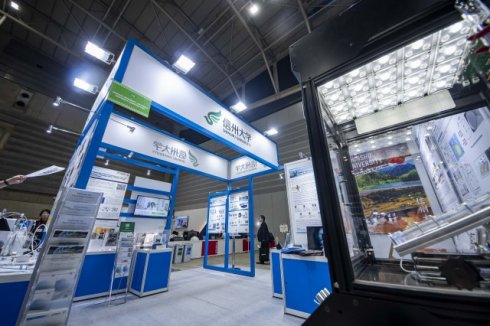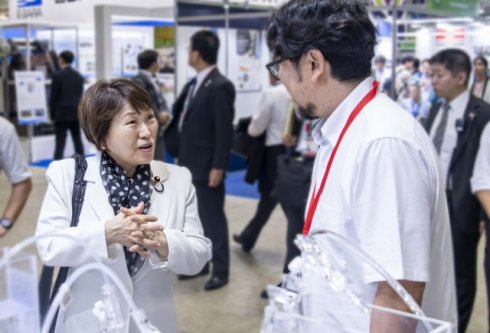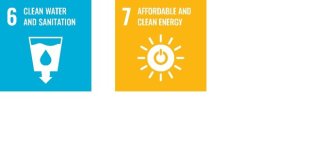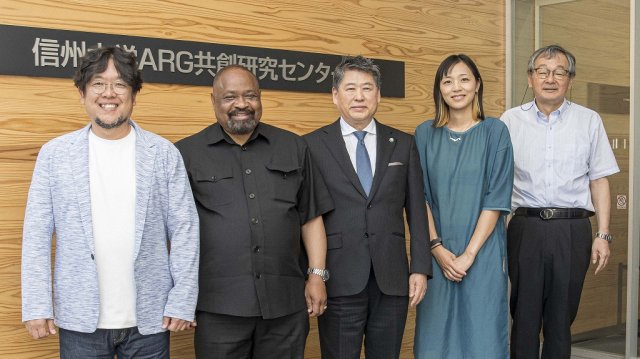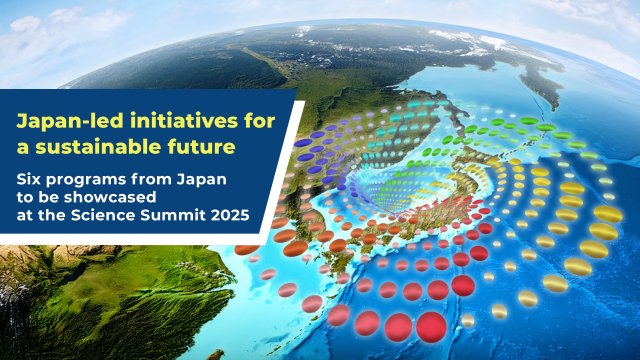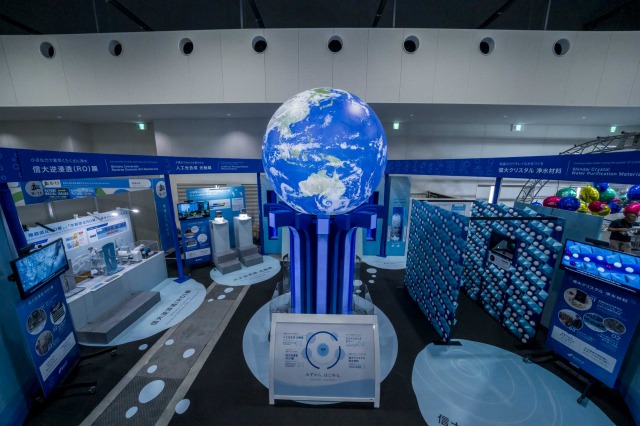Shinshu University Exhibits at TICAD Business EXPO Sharing Research Achievements to Co-Create the Future of Water and Energy
- Share
- Tweet
- Send to email
Shinshu University was the only university to exhibit in the “Transforming Infrastructure” zone at the TICAD Business EXPO, held concurrently with the 9th Tokyo International Conference on African Development (TICAD9) at Pacifico Yokohama from August 20 to 22.
The university showcased its latest research achievements in water resources and energy, focusing on the “Aqua Regeneration Technology” promoted by the Institute for Aqua Regeneration, attracting significant attention from many visitors.
Shindai Crystal® Water Purification Technology
The Teshima Laboratory introduced a water purification technology that utilizes the high-performance crystal “Shindai Crystal®,” grown using the flux method, to efficiently remove harmful substances such as heavy metals and fluoride. Currently, demonstration tests are underway in Tanzania, raising expectations for its international deployment.
Nanomaterial Composite Reverse Osmosis (RO) Membranes
The innovative RO membranes developed by the Rodolfo & Endo Laboratory, utilizing nanocarbon, has a wide range of applications from seawater desalination to household water purifiers. It has been proven to be resistant to fouling and capable of efficient water treatment. Visitors were able to experience its performance through an experimental unit.
Photocatalytic Green Hydrogen Production
The photocatalytic technology developed by the Dōmen & Hisatomi Laboratory directly generates hydrogen from water using sunlight, achieving world-leading efficiency. As a future large-scale clean hydrogen supply technology, it attracted significant interest from many attendees.
Next-Generation Biodegradable Plastics and Mycelium Pulp
The Taguchi Laboratory introduced “LAHB,” a new polylactic acid material confirmed to biodegrade even in the deep sea. It garnered attention as an innovative biodegradable material contributing to solving the worsening plastic waste problem in African countries. Additionally, the new material “mycelium pulp,” utilizing underutilized mushroom resources, was introduced, resonating with attendees regarding the importance of effective resource utilization.
Hydrogen Isotope Separation Using Nanoscale Materials
The Tanaka Laboratory presented research on novel ion exchangers that efficiently separate deuterium and tritium by integrating computational science and materials science. Attendees were amazed by the potential applications for future lunar resource utilization and nuclear fusion power generation, highlighting the advancement of science and technology.
Nano Carbon Battery
The Zettsu Laboratory introduced a “nano carbon battery” aiming for a 100-year lifespan by utilizing carbon nanotubes as a conductive material. Possessing high output and rapid charge/discharge capabilities, its practical application is advancing through industry-academia collaboration. It is anticipated as a battery technology to meet future energy demands.
Water Purification Microorganisms
The Shimosato Laboratory showcased environmental remediation technology utilizing indigenous microbial communities that decompose harmful substances in water. As a nature-cooperative bioremediation technology, its application in decentralized water purification systems is anticipated, drawing significant interest from attendees.
During the event, diverse visitors including Minister of Education, Culture, Sports, Science and Technology Abe, representatives from African countries and Japanese companies, as well as government representatives, high school and university students, and alumni visited the booth. We were pleased to receive positive feedback regarding joint research and commercialization, as well as to hear from students who expressed interest in pursuing graduate studies in the future.
Based on the connections this opportunity allowed us to form, we will move forward to develop research collaborations and industry-academia partnerships.
Shinshu University, selected as a university of research excellence in the J-PEAKS* program, is tackling global water environmental issues.
*J-PEAKS: Program for Forming Japan's Peak Research Universities (Japan's MEXT)


